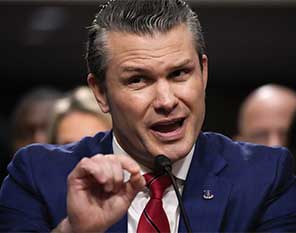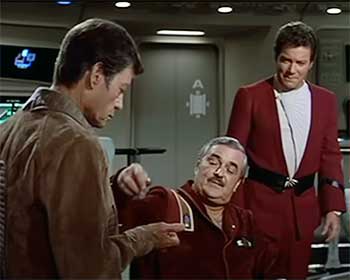The clown cabinet and the phantom infield

Pete Hegseth does not care that he is in no way qualified for the job he's been nominated to
I've been busier than usual the last few days, so stuff has happened and I've yet to catch up on it all. But some thoughts on a couple of things I have been following:
-
Pete Hegseth's confirmation hearing for Secretary of Defense began today in the Senate Armed Services Committee, and, rather predictably, it sucked. Hegseth himself was a bloviating fount of machismo and bullshit—talk of "restoring lethality" to the military (has the army been using stun guns all this time? Are Navy missiles somehow designed to deliver fungal mushrooms and not mushroom clouds?) and "patriotic," "America-first" goals—who avoided answering any question of substance while making sure to get all the boot-licking talking points in to show his would-be boss, the once-and-future (gag) President VonClownstick, that he'd be an obedient and obsequious toady.
Democratic Senators tried to hold Hegseth's feet to the fire to a degree, but thanks to the limitations on their time and an apparently coordinated effort from the Republican majority (gag) to dismiss every point brought up by a Democratic questioner, their efforts basically failed to move the needle. Still, Mark Kelly and Tammy Duckworth each refused to accept a non-answer to their questions but it mattered not since Hegseth talked over them and essentially filibustered them until time ran out. Republican Senators made excuses for Hegseth's disqualifying behavior and incompetent background. The committee chair Roger Wicker (R-Mississippi) kicked things off with an invitation for Hegseth to bullshit his way through dismissing the reports of his awfulness. Markwayne Mullin (R-Oklahoma by way of system 892) channeled his MMA performer persona and equated Hegseth's drunkenness and infidelity to behavior of Senators in the room in a weird attempt to negate the troubles associated with a potential Secretary of Defense showing up to work drunk off his ass.
Every Republican on the committee revealed themselves to be one or more of the following:
- Themselves unqualified to hold their own job
- Uninterested in the function of the role of Secretary of Defense
- Obsessed with "wokeness" as a barely-concealed avenue to promote their own racism and misogyny
- Spineless cowards who bend the knee to Trump over all else
The Democrats all said good things and made as much as they could out of Hegseth's myriad negative qualities, but nothing put the former Fox "News" anchor on his heels, nothing made a lick of difference to any of the Republicans, and in some cases the questioning was too cordial. Duckworth was not, her time was well spent and appropriately aggressive, but Jack Reed's genial "I do not believe you are qualified for the overwhelming demands of this job," while substantively on point, conveyed no sense of scale. Jean Shaheen and Kirsten Gillibrand took Hegseth to task for his misogyny, Gillibrand doing the better job, and Hegseth simply did not care. Tim Kaine (D-Virgina) brought up his spousal abuse and womanizing, but Kaine did it all with kind of a smile, which is usual for him and not special here, and wasn't able to hold his own. Elizabeth Warren (D-Mass.) took on Hegseth's about-face on his sexist remarks after being nominated, and thankfully wouldn't tolerate his attempt to filibuster her, but again did not get any suitable answers. Hegseth wouldn't even answer a question about whether he would abide by the pledge he wants every general to make to not work for the defense industry after leaving the service.
Duckworth was the star of the hearing, among other reasons for pointing out Hegseth's financial improprieties and noting that "our adversaries watch closely at time of transition, and any sense that the Department of Defense is being steered by someone who is wholly unprepared for the job puts America at risk." But even that made no difference to the Republicans.
As Tom Nichols put it in a piece covering the hearing for The Atlantic, "America's allies should be deeply concerned; America's enemies, meanwhile, are almost certainly laughing in amazement at their unexpected good fortune."
-
Item two is far less important: the Seattle Mariners' offseason. After having a conversation the night before with a friend about what the actual hell the Mariners' front office is even trying to do to address their many needs before Spring Training begins next month (from what we can tell from the outside, nothing; though surely things are being attempted that have flopped, unsurprisingly given how stringent the budgetary decree from above is), I had an umpiring shift that included a game with a player that works for Mariner de-facto GM Jerry Dipoto's department of baseball operations. I asked him when we were going to hear anything regarding the gaping black holes around the Mariner infield and he suggested that, while his official answer was "no comment," perhaps something was imminent. Now, I don't know how high up the chain this guy is in the baseball ops office, he might know a lot or he might know next to nothing, but he does seem to know more than I do, so I was keeping an eye out and sure enough, the Mariners made two player acquisitions in the days that followed. Sadly, they both mean very little and neither fills a need for regular players at first, second, or third base.
First of these moves was the signing of free agent Donovan Solano, late of the San Diego Padres and Minnesota Twins. Solano has played third, second, and first base, put up pretty good on-base numbers, and looks like an excellent guy to have on your bench. But he's 37, has never been an everyday player, and while a useful pickup appears at best to be a platoon partner for Luke Raley at first base. At least he comes cheap.
Next was Tuesday's purchase of Miles Mastrobuoni's contract from the Cubs. Mastrobuoni had been DFA'd, meaning the Cubs had no use for him, and in nine years as a pro he's managed three uninspired partial seasons in the Majors as a utiltyman. He did have a few good Triple-A years, or partial years, but the ceiling for him seems to be a replacement for the more interesting and more versatile Sam Haggerty, who the M's sadly let go earlier in the offseason.
Way to get my hopes up, anonymous softball player. Psych! (Not really, I remained skeptical throughout.)
This metaphor is a little too on the nose

I'd been away from the news today, mostly, and had only been tangentially aware of another round of California wildfires happening. Checking in with things, I now know that one of the most devastated areas is a part of Los Angeles I know fairly well.
Pacific Palisades is where my grandfather lived for most of my life, and probably about half of his, in two different stints. I've not had reason to go there since Grandpa passed away in 2014, but I visited countless times over the years and spent many an hour in his neighborhood, walking the wealthy streets of the Palisades and driving the canyon roads to and from the ocean and eating at pizza joints and ethnic restaurants along Sunset Boulevard.
Grandpa's house was near the southeasternmost part of the fire zone, as it stands here on Wednesday night. That house had already been sold and demolished to make way for someone else's new McMansion, but whatever is there now is likely either already burned or not long for the world.

The bounds of the Palisades fire as of about 10:30pm January 8th.
In the blowup map below I put a little yellow dot where Grandpa's house was.
I saw video footage of the nearby Gelson's market consumed by flames; the former drug store where I once bought comic books is a smoking ruin; the grounds around the high school my mom went to were blazing.
Adam West's old house, where Grandpa took me once in 1977 to meet TV's Batman, is likely gone. The charming little Mexican restaurant that was Grandpa's favorite—and that made some of the best salsa ever created—was, I think, already out of business, but that whole block may now be nothing but embers. The Post Office where Grandpa had a couple of encounters with Dodgers broadcaster Vin Scully may still be standing, but as charred bricks. Reports are that Will Rogers State Park, where I think we had a couple of events with extended family, if I remember correctly, has been pretty thoroughly wiped out.
Things change, nothing is constant, and the world turns on. The people that live in the Palisades are generally wealthy, so it will rebound and new structures will replace the old. But I find I feel its loss a little bit. Grandpa's been gone a while, I've gotten used to his absence though I of course miss him, but even though I might not have ever gone back to his old neighborhood I am sad that it's now mostly destroyed.
As a metaphor for our new year to come, it lacks subtlety.
1 Comment
The more you overtake the plumbing...

I've been spending some time this week upgrading this here website's under-the-hood guts. Or, more accurately, I've been putting together new guts with an eye toward moving the database making up all of my posts and such from these old guts into the new guts. But it may be more trouble than it's worth.
StarshipTim.com has been in this basic configuration for many years now, and over that time I've made modifications to so many different elements of its core infrastructure that whenever I think I'm about ready to make the switch I realize another of my custom mods is missing from the new guts. The latest is in the commenting system—I need to have some form of spam filtering or else I just get inundated with bot comments (that's one reason I was even contemplating a guts upgrade), and I can't seem to get my foil-bots-with-math thing to function in the new guts. That may end up being an easy fix, but in the meantime I've spent all afternoon/evening on this and though I realize it's good "exercise," as it were, to bring things up to PHP conventions that are less outdated, it won't really affect anything that anyone will see. Unless I inadvertently break things. Which seems likely at this point.
The upgrading is only going to be useful to me on the back end of things, and really it functions just fine now; I just know that eventually servers will insist on running more modern PHP code and while I have a slow week it seemed like a time to get ahead of that. But right now I'm just cursing the march of progress and am abandoning the effort for the evening while I raid my fridge for dinner.
This has been a Pointless Blog Entry™.
No Comments yet2025 as film

I only have a few minutes before I need to head out to an umpiring shift (ah, winter league...so far it's been pretty mild weather, but tonight will be in the 30s), so just a quick post today and one I largely lift from someone else.
Once again, that someone else is Craig Calcaterra, who in his Cup of Coffee newsletter today recounts a social media prompt that read "The movie that was number one at the box office on your tenth birthday is how your 2025 will turn out for you." Craig turned 10 in the spring of 1983, when the third (or sixth, depending on your particular thinking) Star Wars movie premiered. Here is his response:
In a time of rising fascism and authoritarianism I'd like my 2025 to turn out the way "Return of the Jedi" did. If we're being literal about it that means that (a) my adorable little friends will defeat my enemies after which they will roast and eat them while I will, personally, with the help of some barely-controlled rage, beat the crap out of either J.D. Vance or Elon Musk at which point they will switch to my side of things, throw Trump down a bottomless shaft, and then themselves die. That's a scenario that is pretty unlikely to actually transpire but, as they say, rebellions are built on hope.
...
[But if we] go with the number one film immediately after my tenth birthday, it'd be the "Saturday Night Fever" sequel, "Staying Alive." That movie is horrible in conception and execution and is basically unwatchable, but the title sets what is at least a moderately realistic goal for me in 2025, and I feel far more comfortable with that.
As usual, Craig, we reach.
For the record, the number-one film on my tenth birthday was Superman—The Movie, which while not as on-target as Return of the Jedi is for Craig, still works in that, like Superman, I would also like to fly fast enough to go back in time and save Lois Lane (or someone) before delivering the egomaniacal greed-obsessed real estate con artist to prison.
6 CommentsReflecting on JC

in·teg·ri·ty (/inˈteɡrədē/), noun: see “39th President of the United States”
As I've been sick for the past week, I haven't consumed as much in the way of news or opinion pieces as I might otherwise have done following the death of Jimmy Carter last Sunday. Regular visitors here will already know that Carter was a personal favorite of mine, and that much of what I have read/heard on the subject these past few days I already knew about. But some bits are worth passing around, so if you'll indulge me in a few President Carter Tribute Links:
- Andy Borowitz breaks from his traditional satire to give a brief note on how the country screwed itself by electing Carter's opponent in 1980.
- Jeff Tiedrich instructs, "in a world of Donald Trumps, be a Jimmy Carter."
- Finally, as always, good ol' Craig Calcaterra has interesting things to say. Craig looked at President Carter's "crisis of confidence" speech from 1979 that is unfairly maligned as "the malaise speech," and said this:
Looking back at it from 2024 it was a speech that, on the merits, was actually pretty wonderful. It was a speech that treated Americans as serious people who could be leveled with. People whose help was needed to face a threat that affected everyone. People in whom, he said, he had confidence to meet the big challenges facing the country even if they were, at that moment, doubtful that anything could be done. It was a speech that, if its ideas were truly embraced, would’ve made this a much different and, in my view, much better America.
Those ideas were not embraced, of course. To the contrary, the ideas behind the Crisis of Confidence speech—acknowledging the country's problems, noting that those problems went deeper than most appreciated, and arguing that they can only be solved with shared sacrifice—were cynically but deftly exploited by Ronald Reagan’s whole “nothing is wrong, Americans don’t have change anything and can continue doing whatever the hell we wanna do forever” vibe. Reagan understood that Americans ... will always believe sweet lies over harsh truths and they will always reject demands of sacrifice if someone gives them a permission structure to do so.
...
I consider America being given the Crisis of Confidence speech specifically and being presented with Jimmy Carter's civic and moral example in general, only to abandon virtually everything about them wholesale, to be the point when Americans turned their backs on what truly made this country great. It was at that point that the country decided that it was not just OK but it was virtuous to be selfish and to reject even the suggestion of sacrifice.
If he had to go—and not only was he 100, he was a decrepit 100 after deciding to forego further treatment for what I presume to have been cancer resurgence (he'd had aggressive melanoma and brain cancers in the past), so he kind of did have to go—I'm glad it was before the change in administration. I can't imagine the 45/47 crew giving Jimmy anything close to the level of respect he's due, whereas President Biden is doing it right. (I'll be pleasantly surprised if Biden's decree of 30 days of flags flying at half-mast actually makes it the full 30 days since the bad guys take over in just 20.)
Jimmy didn't always get things right, but he did always give things thought. He wasn't often persuasive, but he was always honest. Craig is right when he says the election of Reagan in 1980 was the turning point—so very, very many of our society's problems can be traced back to the Reagan Administration—and I've often thought that 1980 was far more critical to history's trajectory than any year since.
Jimmy Carter could have faded into the background after losing his bid for reelection to someone who embodied so much of what he warned Americans against, and in the early months of 1981 he was quite despondent. But before long he rallied himself and instead went about affecting change with his post-presidency on the side of good whenever he found a way to do so. With Trump 2.0 just three weeks away, we all need to emulate that—the country lost its mind and elected devilish fiends, but after we lick our wounds some we can still champion the world's better angels.
No Comments yetThis is your brain on drugs

Today is the first day since early on Christmas evening that I have felt more or less healthy. Where and when I encountered the cold bug that got me is a mystery, but that's the way things are in a society (and why mask mandates before COVID vaccines were a really good idea). I'm not at 100% yet, maybe 85%, but the remaining trouble is all in the form of sinus drainage—gross, but comparatively painless. But I was basically out for a week, and I do extend gratitude to the cats for their understanding and for continuing to use the litter boxes even though they weren't getting cleaned in as timely a manner as usual.
During my downtime I made judicious use of off-brand NyQuil, which helped me sleep, but contributed (I assume) to pretty weird dreams. In one I was intending to move out of my spacious condo and back into a 550-square foot apartment on 45th St., and in the dream my spacious condo was even more spacious and had a hidden sub-basement like a batcave. I had another dream that involved strange doing with cats of the past going missing, which, really, subconscious mind, WTF? Was that kind of freakout really necessary to inflict on my sleeping brain? There was also something in that dream about living in a trailer that reshaped itself as needed like a transformer toy, and I never played with those, nor have I ever seen the I'm-sure-are-terrible movies based upon them. None of that was important, though, finding the missing sometimes-Pixel-sometimes-Cloudy-sometimes-Charcoal feline was primary.
As I'm not-quite 100% yet and I have two softball games to umpire on Thursday night, I may do one more night of generic-NyQuil-aided rest so I'm not getting up to blow my nose and/or spit mucus into the sink twice and hour or whatever. Hopefully the dreamscape will be more adventurous in a plumb-my-subconscious-for-fun-fantasies way than a do-a-deep-dive-into-anxieties-and-childhood-traumas way.
No Comments yetFarewell Jimmy

I'm still feeling rather sick and NyQuil-addled, so I'm not up for writing a lengthy post, but I had to acknowledge the passing today of President Jimmy Carter, one of my most revered public figures.
President Carter held on for a good while in hospice care, made it through being able to vote for Kamala Harris, as he said was his goal, until today finally following his wife of 77 years into the unknown (Rosalynn died last year).
Rather than try to articulate anything here today, I will simply refer you to a piece I wrote after President Carter went into hospice care a couple of years ago.
Godspeeed, James Earl Carter Jr. You were among the very best of us.
No Comments yetHoliday hibernation
Howdy, Internet. I hope all had a nice Christmas. Well, hang on—I hope most had a nice Christmas. There are some people involved in and responsible for the incoming governmental hellscape that frankly should have had a miserable time, just karmically.
Anyway, mine was OK; I'd done my celebrating the week before with friends, so Christmas day proper was just me cooking holiday food and watching bad Christmas movies and also, as a palate cleanser, the Hawkeye series, which is really good and all takes place during Christmastime.
But I also started to feel under the weather that evening, with a sore throat coming on, which history has shown is the first stage of at least a cold of not something more. Yesterday and today have been basically sick days; holed up with soup and lozenges and sleep and comic books. The cats are rather antsy, they've got a lot more energy than I do right now and I've not given them proper play time.
Anyway, I'm popping throat drops and full of snot and generally foggy in the head in a not-the-usual-depressive-way-but-in-a-crap-in-my-sinuses way, biding some of my awake time playing OOTP computer baseball and managing the 2021 Mariners to a 94-loss season, which wasn't supposed to happen. I'll have to rebuild a little for AU-2022.
This cold/whatever needs to run its course in a few days' time, as I'm scheduled to start umpiring again next week, and winter league is not going to do a cold any favors. It's kind of brutal, winter league, but I know only the die-hards tend to sign up for it and they're generally people I've come to know a little and it's generally the case that they don't give me any real problems, so it can be fun despite the cold/rain/snow/sleet/etc. we end up playing in.
No Comments yetSocial engagement

After Twitter got destroyed by Elon the Terrible, I basically did without any social media for a while. I still had a Facebook account, but that service and its overlords are problematic (to say the least) as well and I never hang out there anymore. I tried a few of the new Twitter competitors as they came around—Hive, Post, one other one I've already forgotten the name of—but they all lacked functionality or otherwise rubbed me the wrong way somehow. I never tried Mastadon or Threads; the former seemed way too complicated and the latter is, like Facebook, a Zuckerberg joint, and I'm not a fan. Then Spoutible came along, and I liked that one. I was hopeful (still am, to a lesser degree) that it would be the platform to rise to the top of the heap and become the "new Twitter," for lack of a better term. But it's BlueSky that seems to have won that war, that's the one that now has the userbase needed for such a thing to succeed and, for me, to be interesting.
So I'm on BlueSky now. Still on Spoutible, too—I prefer that service as an entity, with its BotSentinel integration and its general Bouzyness, but it just doesn't have the reach BlueSky has now with its much greater numbers. Spoutible also doesn't have the sort of integrations useful for sites like this, whereas BlueSky does. Hence the new feedbox at right (if you're reading this on a phone screen, it won't be there unless you turn it on its side to landscape style) and the share buttons, which now have share-to-BlueSky as well as Facebook (because for some damn reason Facebook is still how tons of people use the Internet in toto) options and no more Twitter options. Because screw that guy and his now-shitty rebranded platform.
Anyway, at some point I'll get back into the habit of "skeets" and "spouts" of things that aren't meaty enough for a post here.
No Comments yetMiscellany

Weird but fun, Interior Chinatown is worth a watch
Today's post: A random assortment of disjointed stuff!
- The dishwasher saga is over, with a new one purchased, delivered, and installed and the old one carted away to whatever scrap heap such things are taken to. I hadn't initially planned to replace the broken one so quickly, but holiday sales at Lowe's convinced me I was better off spending $600 now, on a good one on sale, than later on a cheaper one at regular price. It works, it's quiet, and most importantly, it doesn't leak into Rachel's kitchen downstairs.
- I've spent a chunk of time doing maintenance on this here website, including recreating the sketches page and beginning to populate it with stuff readily available, i.e. mostly stuff from the last few years that was either already scanned into my computer or at hand in my currently in-use sketchbook. There's other stuff in my hard drive already digitized, things that were on prior versions of my blog, but they were posted in the olden days of the Internet when nobody had a screen resolution bigger than 800 pixels and are thus pretty lousy scans. I'll have to find the originals and rescan them at some point. Anyway, the current format has clickable icons that produce a fullscreen image and a button to continue to "notes and comments" that takes you to a page for that individual sketch and any blathering I may have done about it, plus a commenting form just like a blog post. Click anywhere other than the button to close the fullscreen image and return to the sketch menu.
- I had my Christmas the other night at K&E's place, enjoying delicious food and talking about the world and also TV. All three of us love the Hulu show Interior Chinatown, starring Jimmy Yang and Chloe Bennett. It's a wacky comedic sendup of action movies, the Law & Order franchise, and meta-storytelling that takes place both within a Law & Order-style TV show and around a mild-mannered Chinese-American's family in a fictional Chinatown neighborhood. Recommended. We also agree on the greatness of Michael Schur's A Man on the Inside (Netflix), which I discussed briefly earlier but deserves a second recommend. The Diplomat (Netflix) also works for all of us, and we commented on the overlap of cast and crew from The West Wing on it (even though neither of them have ever really watched West Wing, which is really a bummer for them). Shrinking (Apple TV+) wasn't something they'd seen but which I think is terrific; they liked Slow Horses, which I've not sampled to this point. I'm very much into Silo (Apple TV+) and, naturally, the just-concluded (boo) Star Trek: Lower Decks, but know better than to try to convince K&E to watch those.
- I was gifted the book What's Next on that early-Christmas evening, and though I've yet to start into it, I am anticipating some great West Wing reflections and truly wonder how it will feel to revisit the details of the fictional Bartlet Administration while living in the impending nightmare of Trump 2.0, Now With More Oligarchy.
- I just learned that baseball Hall of Famer Rickey Henderson died today. One of the all-time greats, Rickey was a fantastic character with is arrogant self-assuredness, his speaking in the third person, and his generosity to others. Despite being exactly my kind of ballplayer—the stolen base king! Consistently walked more than struck out!—he was never one of my favorites, maybe because he took the steals record away from one of my faves, Lou Brock, or maybe because he spent his career primarily with the Oakland A's and the hated New York Yankees. He did spend part of one season in Seattle as a Mariner, in 2000, in the waning days of his very long career, and was always fun to watch no matter who he played for. My two favorite Rickey Henderson anecdotes come from other players. One, from former Seattle Mariner Harold Reynolds, who won the stolen base crown in 1987 with 66 steals (because Henderson was injured that year) and got a postseason call from Rickey congratulating him but also containing Rickey-style mockery, with Henderson ending the call with "Rickey would have had 66 by the All-Star break." Two, from fellow Hall of Famer Mike Piazza, who was Rickey's teammate with the New York Mets; Piazza recounted how Rickey voted when teams would be divvying up the postseason bonuses among the support staff. “Rickey was the most generous guy I ever played with, and whenever the discussion came around to what we should give one of the fringe people—whether it was a minor leaguer who came up for a few days or the parking lot attendant—Rickey would shout out 'Full share!' We’d argue for a while and he’d say, 'Fuck that! You can change somebody’s life!'” Apparently Rickey died from pneumonia, less than a week shy of 66 years old. Bummer.
- Earlier this week, Craig Calcaterra referenced a Washington Post article called "America's Best Decade" in his newsletter. The article analyzes results from polling 2,000 American adults on which decade was best for 20 different things, like best movies, best economy, best music, best reporting, and so on. There are some interesting (though not surprising) things, like Republicans are twice as likely to think the 1950s were awesome as other people are (hey, Republicans, that being the case, let's go back to the 90% marginal tax rate that existed then, which made for a lot of the circumstances you say you want!), or that people think the "best music" is the music they listened to in their formative years. But Craig's takeaway was surprise at the generational consistency of people liking their own youth (not just the music, but everything). "Americans feel nostalgia not for a specific era, but for a specific age," says the article. "The good old days when America was 'great' aren’t the 1950s. They’re whatever decade you were 11, your parents knew the correct answer to any question, and you’d never heard of war crimes tribunals, microplastics or improvised explosive devices." There's a handy graph to illustrate:

If they'd polled me, I might have skewed the results just a smidge. I mean, if I followed the pattern, I'd have my bests coming in the 1980s, and frankly there was a lot about the ’80s that wasn't all that. I mean, sure, those years were largely good for me (well, not ’89), but thinking big picture not so much. I'd say... Best Music? 1970s. Best Movies? I'm not really big into movies like some people, so I don't have a real feeling on this, but I guess the 2000s? Best Fashion? Hell if I know, but certainly not the ’80s; maybe the ’60s, since it spanned a lot of stuff. Happiest Families? Again, WTF do I know, but I'd say maybe 1990s since (a) women had far more agency than in prior decades, and (b) economically things were stable and good throughout. Most Moral Society is a question that inevitably tracks one's politics and I'd be tempted to say the 2020s if not for what happened last month to show us how many millions of Americans are still racist, misogynist, cruel asshats. Most Reliable News Reporting? 1970s again, though it really depends on how you quantify; there's a lot of fine reportage more recently, but also increasingly widespread BS from the dawn of cable TV forward. Best Economy? 1990s. Best Radio? I've no proper context for this, but given how much more radio was a thing the further back you go, maybe the 1940s or ’50s? For me, again the ’70s. Best TV? Right now, man. So much great TV being made even as the TV delivery system is transmogrifying. Least Political Division? Um...never? I mean, now is the worst in ages, but there's always been a lot; maybe the ’40s, what with the war being a unifying purpose. Best Sporting Events? For me, that's limited to baseball, really, and in this area I fit the trend—1980s baseball was great and I wish we could exhume Bart Giamatti to be Commissioner again. Best Cuisine seems like a dumb category, as food doesn't change, really, it's how we eat that changes. I like good food whenever it's eaten. Anyway, kind of an interesting survey.
America the Stupidful

I had some friends over the other night to nerd out a little on some DS9 and Lower Decks, but we also gabbed about other stuff and inevitably the subject turned to our individual post-election anxieties and outrage. I guess we’re still in the assign-blame stage of our trauma, because we spent a good chunk of time on how is it that so many Americas are this stupid?
I hesitate to use the word “stupid.” Yet, while un- and misinformed is a true and more specific substitute phrase, it fails to capture the greater scope of failings. Why did the Republican propaganda campaign work so well, especially considering that the garbage being claimed in it was so obviously false and easily debunked with very little effort? People accepted the misinformation without any critical thought because, what? Laziness? Indifference? Need for simplicity?
History has shown us that the Republican party is (a) very bad at governing when it comes to the bulk of the American public; (b) completely devoted to concentrating as much wealth in as few hands as possible so long as it includes their hands; and (c) expert at manipulating low-information voters and using fear of The Other to focus voter attention away from their real priorities, which are profoundly unpopular with the vast majority of Americans. The New (i.e. post-“Tea Party”) Republicans have taken the fear tactics and psychological warfare manipulation playbook and kicked it into overdrive.
Despite these New Republicans being openly fascist, despite the plain-to-see influence of corrupt billionaires on their agenda, despite literal criminal convictions among many of the major players, they won election largely on the basis of anti-LGBTQ posturing, demonization of immigrants, coded and not-so-coded racism and misogyny, and fantasy fiction about how money works. All bullshit, all reliant on generating a lizard-brain emotional fight-or-flight response and completely bypassing rational thinking in their audience.
It shouldn’t work. And yet, here we are.
It’s the last of those things—fantasy fiction about money—that’s the most maddening to me, both because it underpins all the others and because it’s so easily refuted for anyone who bothers to look into it.
Also, it isn’t just a New Republican thing, it’s been a Republican thing for ages, a long con on the American people going back a century but that really got rolling with Ronald Reagan. Somehow it became conventional wisdom that Republican economic policies were more sound, when in fact, with the possible exception of the Dwight Eisenhower administration’s, every Republican agenda since the 1920s supported concentrating more wealth with the rich and putting more of the onus for funding the government on the lower classes. Favorite methods for this were shifting the tax burden downward and eliminating regulations on businesses, always leading to disaster.
GOP: GREED OUTWEIGHS PUBLIC INTEREST
Warren G. Harding became President in 1921 after campaigning on a “return to normalcy” after the Spanish Flu pandemic and World War I, appealing to a nostalgia of days gone by rather than the needs of the present and future. He opposed the League of Nations and championed deregulation, but had little else to work with in terms of policy goals. According to Woodrow Wilson cabinet officer William McAdoo, a typical Harding campaign speech was “an army of pompous phrases moving over the landscape in search of an idea,” while the New York Times described voters’ reception of Harding’s words as “a reflection of their own indeterminate thoughts.”
Harding cut taxes, including the elimination of an “excess profits tax”—wouldn’t that be handy today?—and reducing the top marginal income tax rate from 73% to 58% and eventually to 25%. Regulations were slashed on the railroad industry and business generally and his administration was rife with corruption. Though in the short term the economy boomed, lack of regulation under Harding and his successor Calvin Coolidge allowed for monopolistic industry and excesses of greed and led to the Great Depression in 1929. Hebert Hoover was elected in 1928, the third consecutive Republican administration, and took office with this statement: “Given the chance to go forward with the policies of the last eight years, we shall soon with the help of God, be in sight of the day when poverty will be banished from this nation.” He said this despite growing income inequality that was seeing the poor get poorer, then stock market crashed mere months later. Coolidge and Hoover had both been warned that economic calamity was coming but neither did anything to head it off and Hoover did nothing to effectively combat the Depression when it came, though he did increase taxes on the wealthy—basically the only people left in the country with any income to speak of—and attempt reforms, just not to the scale required. It took Democrat Franklin Roosevelt’s New Deal to start righting the wrongs of the three Republican administrations and ultimately the economic impact of World War II to fully bring the nation out of the Great Depression.
From FDR on, only the aberrant presidency of Eisenhower, only nominally a Republican (he described himself as a “progressive conservative” that believed in robust government services, at least compared to other Republicans), broke the string of Democratic administrations until 1969, when Republican Richard Nixon took office. Nixon inherited a generally healthy economy that was experiencing high-for-the-era inflation of over 4% thanks in part to the expense of the Vietnam war. Nixon policies turned surplus into deficit, begat recession, and, despite some easing in the short term, higher inflation that peaked at 11%. The second Nixon recession continued after he resigned from office and successor Gerald Ford saw unemployment hit 9%, a post-WWII record.
But it was the “Reagan Revolution” that kicked off so many of the troubles we live with today.
Declaring that “government is the problem,” Reagan stormed into office in 1981 to implement “trickle-down economics,” the long-since discredited theory that giving more money to wealthy interests will result in that money “tricking down” to everyone as those at the top hire workers. His reforms cut the top marginal tax rate from 70% to 50% and eventually to just 28%; cut corporate taxes and tripled the exemptions for the estate tax; brought on a two-year recession; saw unemployment top 11%; busted labor unions; and halved the number of regulations on industry. The wealth gap began to widen greatly and the middle class started to shrink.
Reagan’s deregulation of banking and broadcasting gave us the Savings and Loan crisis (which cost taxpayers $160 billion as the government had to pay back customers of nearly 750 S&L institutions that had their savings pilfered by embezzlers and lost to previously-illegal investment schemes) and the elimination of the Fairness Doctrine, plus ushered in those lovely pharmaceutical commercials we see constantly on TV. Deregulation of the insurance and healthcare industries put profit motive front and center, eliminating non-profit requirements for hospitals and health insurance; public health programs were slashed, the percentage of uninsured Americans spiked, medical debt became a common thing.
We’ve never recovered from Reaganomics, with successor Democratic administrations only managing to make marginal improvements and successor Republican administrations doing their damnedest to make things worse.
George W. Bush repeated the deregulatory escapades of the 1920s and the budget-busting tax breaks and military spending of the 1980s, giving us sanctioned energy scams and the Great Recession of 2007, not to mention a mountain of debt and an even more enormous wealth gap between the top of the heap and the bulk of the country. Trump took corruption, fraud, and reverse-Robin-Hooding to levels previously unheard of, and is so incompetent that his mismanagement of the COVID pandemic contributed greatly to worldwide economic hardships and inflation unseen since Nixon’s time.
There is nothing, nothing, to support the idea that Republican policies will help the average American economically. They invariably hurt everyone but the super-rich. Trump policy is even worse, promising the most extreme transfer of funds from the poor, middle class, and even well-to-do to the billionaire class.
The middle class comprised two-thirds of Americans when Jimmy Carter left office in 1981. It’s now roughly one-third and falling, thanks to Reaganomics, George W. Bush malfeasance, and Trump criminality.
And yet spouting bullshit at rallies and handing out placards at the RNC that read “Lower Prices Now” convinced people Republicans will help their bank balances? Really?
So, yeah: People are stupid.
1 CommentJust in time for Christmas

Yay, more expenses!
The other night I ran my dishwasher, you know, like you do. Seemed fine. Until I opened it up after it was finished. Then water flooded part of my kitchen.
This kind of thing had happened once before, though not to this degree, so I thought I knew what to do—get into the drainage filters and clean out the muck. Which I did, and there was muck.
This time, though, there was also bits of broken plastic. And a couple of screws. Some part or parts of the thing had disintegrated, clearly. It's never worked all that well since I moved in here anyway, and this struck me as possibly a last straw of sorts.
Anyway, I sopped up my floor flood and emptied the dishwasher of dishes that had to be rewashed by hand and then put it out of my mind until I got a text from my neighbor downstairs asking if I might know why there was a slow but steady drip from her ceiling.
Oops.
I'd sopped up all the water on my kitchen floor, but maybe there was still a small pond underneath the dishwasher? Why hadn't I thought of that?
So tonight I removed the damn thing, and sure enough, about half an inch of standing water under it, plus the thing had somehow accumulated another inch or so of water inside it despite my not having run it in the meantime. Shit. (And removing the dishwasher involved disconnecting the waterline and drainage hose, of course, so more flooding, though comparatively minor. I believe I have two dry towels left, having used the rest to sop up the pond and the new flood.)
Good news is, there should be no more drip-drip into my neighbor's place. Bad news is, I have to get rid of this piece of junk and eventually replace it with a new one, which apparently will cost anywhere from $400-$1200, and that's if I install it myself. Assuming I can get it up into my kitchen. Maybe Lowe's will deliver it all the way upstairs even if they aren't installing? Hm. Anyone have experience with that sort of thing?



